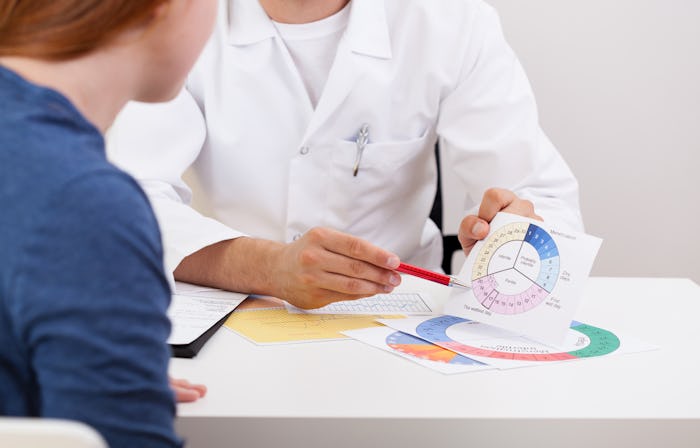Life

How Does Having Irregular Periods Affect Getting Pregnant?
Before I became pregnant with my daughter, I decided to learn everything I could about the process. High school sex ed had led me to believe that simply looking at a penis meant I would be a mother in nine months, but getting pregnant is a tiny bit more complicated than that. It's really all about making sure the sperm is there when you're ovulating, but not everyone knows when that's happening. Especially if you don't have a stereotypical 28-day cycle. So how does having irregular periods affect getting pregnant? Does it make it more difficult?
Well, kind of. According to What to Expect, getting pregnant means timing conception by having sex before, during, and immediately after you expect to ovulate. When you have a regular period, you can determine when you ovulate and use that time to try and get pregnant. But as the American Pregnancy Association notes, trying to track ovulation when your periods are all over the place can be difficult.
However, in some cases, an irregular cycle may mean ovulation isn't occurring at all. A cycle that is between 21 and 35 days is still considered normal and all signs point to ovulation happening, but shorter cycles could mean you're experiencing an anovulatory cycle and longer cycles (more than 35 days) can mean you are ovulating, but not in a regular manner, making conception difficult.
For the most part, an irregular period doesn't warrant much concern. In some cases, if your irregular period also means you're not ovulating, a doctor may prescribe you fertility drugs or treatments to make it possible for you to conceive. But if your period is simply irregular and you are trying to time conception, here are three ways to know if your body is ovulating.
1Check Your Cervical Mucus
When your body is preparing to ovulate, your cervix releases the same cervical mucus it has throughout your entire cycle, only now it's considered fertile. The American Pregnancy Association notes that this mucus is clear, stretchy, and resembles egg whites. If you notice that your body is releasing this egg-white cervical mucus, you'll know that it's the prime time to try making a baby as your body prepares to release an egg.
2Take Your Basal Body Temperature
Your basal body temperature (BBT) is your lowest body temperature in a 24-hour period according to Baby Center. Before you ovulate, your BBT will begin to rise and will stay at the elevated degree until your next period. By taking your BBT every morning, at the same time, before your feet even hit the floor, you can track your body as it prepares to ovulate. Once you've ovulated, you'll notice the pattern, but it's still beneficial to know, especially if it takes more than one month for you to get pregnant.
3Use An Ovulation Predictor Kit
If you want to make it extra easy on yourself to find out when you're ovulating, the American Pregnancy Association suggests picking up an ovulation predictor kit. Since your cycles are irregular, you may have to do more testing each month than the average user, but the tests can predict an increase in the Luteinizing Hormone which shows up 24 to 48 hours before you ovulate.